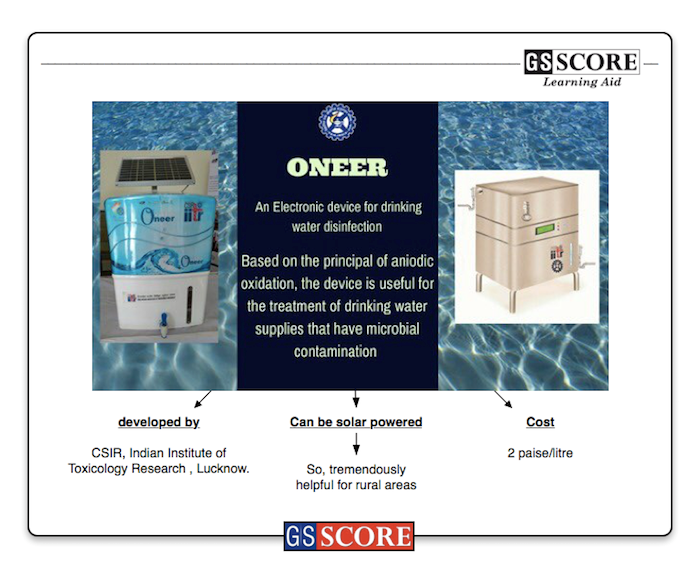

An innovative technology for “Drinking Water Disinfection System” with trade name “Oneer” has been developed by Council of Scientific and Industrial Research, Indian Institute of Toxicology Research (CSIR-IITR), Lucknow.
Context
An innovative technology for “Drinking Water Disinfection System” with trade name “Oneer” has been developed by Council of Scientific and Industrial Research, Indian Institute of Toxicology Research (CSIR-IITR), Lucknow.
About
- The device will continuous treat water and eliminate all disease causing pathogens such as virus, bacteria, fungi, protozoa and cyst to provide safe drinking water to domestic and communities settings as per national and international standards prescribed for potable water (BIS, WHO etc.).
- It will provide access to safe and clean drinking water at a cost of just 2 Paise / Ltr.
- Its community level model has capacity of 450 LPH which can be scaled up to 5000 to 1 lakh L/day and is also maintenance and membrane free.
- The smaller unit of Oneer is particularly suitable for homes, street food vendors, and small establishments.
|
CSIR-Indian Institute of Toxicology Research (CSIR-IITR), Lucknow, a constituent laboratory of the Council of Scientific and Industrial Research (CSIR), was established in 1965. It is the only institute of toxicology in the country contributing towards cutting-edge research and innovation in toxicology. It is working to mitigate problems of human health and environment. It has following objectives:
|
Significance
According to the World Health Organization, "access to safe drinking-water is essential to health, a basic human right and a component of effective policy for health protection”. But, currently, a large proportion of India's rural community is consuming water that does not meet the WHO drinking water quality standards. It is well known that infection through drinking water results in an increase in morbidity and mortality particularly amongst children. The developed technology will enhance the quality of life of common people. It will be helpful especially for rural people since it can be solar powered. At economy front, it is also in line with the ‘Make in India’ mission.
Learning Aid



